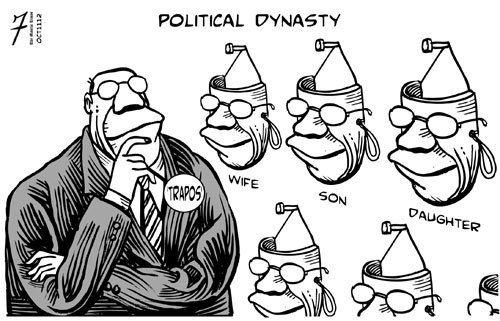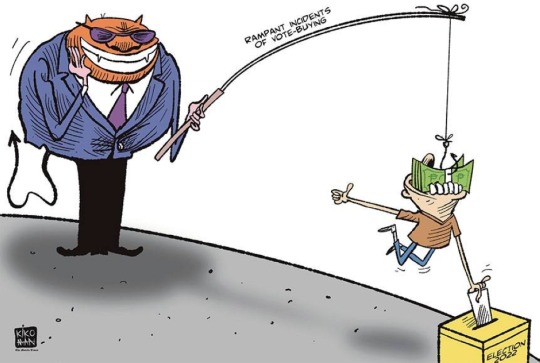Text
The Philippine Electoral System: A Subject for Reformation

I. Introduction
By the people, for the people. Democracy is built under those two founding principles, wherein a participatory government system champions over the absolutism of monarchic regimes. It is a system that fosters and empowers the clamors and longings by the majority, granting each and every individual the liberties to function in and contribute indiscriminately. A component in safeguarding these liberties is the very government that guarantees them, which not only comprises bureaucrats, but also the elected public officials that best represent the interests of their constituents.
Considering the geography of the Philippines, the archipelago is significantly diverse in its population demographic, with islands each comprising people that vary greatly in circumstance based on their location, social status, culture, and even religion. A quintessential component in democracy that greatly influences legislation is the process of decentralization, wherein the duties and responsibilities of the government are sparsely distributed across many constituencies to several offices that can cater to a vastly scattered demographic. One particular driver of decentralization would be the effective representation of individuals by their respective local government officials, which play an influential role in legislation as well as the operational capacity of which the institutions under them conduct. In the context of the Philippine archipelago, representation goes a long way, especially the process of electing the appropriate figures to meet the clamors of a nation that is continually riddled by a slow progression caused by corruption and other downturns.
II. Chapter 1: The Philippine Electoral System As Simulated in the Student Government Elections
My first experience partaking in an election of course took place in my school – Oro Christian Grace School (OCGS) – around the closing weeks of a school year, as we selected our next set of student councilors for the succeeding academic year. Prior to the pandemic, which accounted for the entirety of my elementary as well as my first year in junior high school, I did not care too much about what the organization stood for nor the qualifications of the candidates that ran for student office. I simply voted for who I was closest to, or who's name I was more familiar with. Though, through much exposure brought about by my inclination towards history and politics over the succeeding years, I grew to appreciate the electoral process, even to the minute of levels like my school. It genuinely brought me distaste to see that some individuals aspiring for student office have only decided to run just to polish up their resumes, or perhaps, accumulate more popularity through the process. It seemed as if they did not show any particular regard to revolve their motives around service and integrity. During the several periods of campaigning, I have observed that the traditional strategy of “vote buying” still applies even in the school setting. For instance, elementary children are easily swindled by the material things they are given, and their votes are often shelled towards the party or candidate that gives the most in terms of either quantity or quality. At certain times, budgets are barely respected nor are they properly enforced. Other than being somewhat discouraged by how some pupils in the OCGS community base their voting decisions on, I am uplifted by the fact that some students have acknowledged the significance in basing their votes on a set criteria other than purely by campaign tokens and gimmicks.
Albeit being a low-scale process in a relatively small institution, I have very much observed that the Student Council elections in OCGS serves as a small simulation of how our democracy here in the Philippines functions. From the process of individuals filing for candidacy, to these candidates being elected during election day, to the day of the candidates’ inauguration into office, these exhibit how our country embraces the principles of participation and free choice by the masses, which are quintessential in keeping our government, and even our country, running.
III. Chapter 2: The Hinderences to our Development as a Democracy

The political landscape across the archipelago is seemingly dominated by swarms of political dynasties, a margin of which are motivated by the likes of personal gains and interest. Other than involving the likes of influential names in the ballot, wealth is also a significant quantifier when it comes to winning the choice of the electorate. Elections held even within local government jurisdictions involve monetary flow through “incentives” handed to the electorate as a gesture of good will by candidates for public office; amounts vary depending on how much a particular candidate would chip in for their campaign. It is given that the candidate who shells out more money to give to the electorate would win a seat in the government, and that is the unfortunate truth in a country riddled by, as cliche as it sounds, poverty and corruption. The rise of political dynasties as well as the subsequent act of “vote buying” are two of many prevalent issues that continue to challenge the principles and the foundations of our democracy. They are a continual threat to the bureaucracy and the integrity of our institutions as well the fulfillment of its operations centralized around catering adequately to its constituents.

When I was around the age of eleven, I can vividly recall my parents returning home with a drop of ink on the nails on their thumbs, which indicated that they had casted their vote. Though, they did not return empty handed. They carried with them a couple of envelopes, which contained money inside of them and a sticker of the candidate they voted for plastered behind it. I witnessed the same thing around a few years later, and I have probably already figured out why they returned home each time with money after the elections. Oftentimes here in the Philippines, especially within the localities of the archipelago, aspiring politicians utilize monetary means to influence the electorate’s voting decisions. Typically, the candidate that pledges more money into his or her campaign as a form of “incentive” to the voter would receive more votes compared to the candidates who pledge less.
IV. Chapter 3: Clamoring for the Philippines’ Electoral System’s Reformation
Much can be established to further improve the Philippines’ electoral system with the necessary reforms. It is my hope, if not my belief, that reforms may be put forth to address the elephants in the room, which are both the emergence of political dynasties as well as the vote buying plague. It is established that political dynasties are the incubating chambers for personal ambition through monopolizing political power, hence why it is a necessity that further reforms must be put through to approach this issue. Although there may be an existing law that was passed to address the issue of vote buying and selling, specifically Batas Pambansa Blg. 881, it is unfortunately often neglected and authorities responsible for enforcing electoral provisions fail to do so. If authorities refuse to go about with fulfilling their responsibilities in maintaining the integrity of the electoral system, then how could we, the electorate, believe with faith that reformations could be envisioned and enacted? I am hopeful that, in due time, voter education will be emphasized to educate voters about their rights and responsibilities, and promote informed decision-making during elections.
With time and the necessary reforms enacted to our electoral system, it is my belief that the political landscape would be much more different in a positive light and would fall into a spiral of nurturement. Monopolies over political power by big names in the form of political dynasties would be non-existent, voters would be much more cautious when electing aspiring public officials, and monetary distribution would cease to be a primary accumulator of votes for a candidate aspiring for office. Nations that adhere to the founding principles of democracy are heavily reliant on an educated populace to install responsible and accountable leaders to run the state, and in turn, development and progression is further achieved.
V. Conclusion
Given the deteriorating condition of the Philippines, which is very much tied with the officials we elect into office, the need for electoral reforms has never been emphasized to its maximum. Recurring issues like poverty, corruption within the government’s institution’s, and rising crime rates are issues that all relate to the electoral process; the individuals that we happen to entrust our welfare to, but bend the law to contribute primarily to their own personal successes. It is about time that young minds open their eyes to the imperfection and corruption around them within the political landscape before they become functioning members in the electorate. The crux of the prevalence of these issues in our system of government continue to run rampant throughout many administrations considering the lack of consideration by members of the public in this matter. It is my invitation to my fellow youthful compatriots to be vigilant, as we slowly advance towards the age of legality, wherein we are expected to do our part not just for our families, but for our nation.
1 note
·
View note